![]()
Monday, September 23, 2013
The Al-Nusra Front (Jabhat al-Nusra) is an Al-Qaeda Salafist-jihadi network, prominent in the rebel organizations in Syria. It seeks to overthrow the Assad regime and establish an Islamic Caliphate in Greater Syria, a center for regional and international terrorism and subversion. This study, conducted by the Meir Amit Intelligence and Terrorism Information Center, focuses on the Al-Nusra Front, the most significant organization among the jihadist organizations operating in Syria. The study is structured in seven sections[*], which if read in conjunction with each other, draws a complete picture of the Al-Nusra Front.
Section Three
The Al-Nusra Front’s strength and areas of deployment
The Al-Nusra Front is a Salafist-jihadi organization. It is Al-Qaeda’s branch in Syria and is subordinate to the leadership of Al-Qaeda, headed by Ayman al-Zawahiri. The Al-Nusra Front operates alongside other Islamic organizations that differ from one another in their ideology, military strength, and relationship with Al-Qaeda. Some of the Islamic organizations possess a Syrian political agenda, while others, such as The Al-Nusra Front, have regional or global goals.[20]
It is our assessment that the Salafist-jihadi organizations in Syria have approx. 10,000 operatives. We believe that the Al-Nusra Front, the most prominent jihadist organization, has about 6,000-7,000 operatives. Most of the operatives came to Syria from Arab/Muslim countries, and some from Western countries, to fight the regime. A few of them are Syrians. The number of operatives fluctuates and has been on the rise for the past year or so.
The following are a number of estimates from Western and Arab sources about the size of the Al-Nusra Front. According to an estimate of the British Quilliam Foundation, the organization had about 5,000 operatives in late 2012 (in our assessment, since then it has been joined by several thousand more). An estimate by the Free Syrian Army puts the number of Al-Nusra Front operatives at 6,000-10,000 (Washington Post, November 30, 2012). An Arab website quoted Abu Muhammad al-Atawi, one of the organization’s leaders, as saying that the Al-Nusra Front has 8,000 operatives and their number is still increasing (alwakaai.com). These estimates do not take into account the split that has taken place in the Al-Nusra Front.
The Al-Nusra Front carries out most of its military and governmental activity in northern and eastern Syria, particularly the governorates of Aleppo, Deir ez-Zor, Damascus, and Idlib. The organization’s military presence in other governorates is lesser. A report compiled by the Free Syrian Army and delivered to the U.S. State Department gave the following estimates of the Al-Nusra Front’s force in different governorates (Washington Post, November 30, 2012):[21]
- Aleppo region: approx. 2,000 operatives, most of them in Al-Bab, to the northeast of Aleppo.
- Idlib region: approx. 2,500-3,000 operatives.
- Deir ez-Zor region: approx. 2,000 operatives.
- Damascus region: approx. 750-1,000 operatives.
- Homs, Daraa, and Latakia regions: approx. 1,000 operatives.
In addition, the Islamic State in Iraq and Greater Syria (hereinafter: the Islamic State), the Al-Qaeda branch in Iraq and the Al-Nusra Front’s competitor, plays an important role in combat and civilian activity in northern and eastern Syria. In several areas it enjoys the support of the population, while in others its presence provoked negative reactions by local citizens.
In an article for the Syria Comment[22] (July 18, 2013), Aymenn Jawad al-Tamimi argues that the strength of the Islamic State in northern Syria is on the rise. He says that the Islamic State plays an important role in the fighting on the outskirts of Aleppo and in the surrounding countryside. The organization is trying to expand its influence and consolidate its control over outlying towns in both the Aleppo and Idlib governorates, particularly important cities and towns along the Turkish-Syrian border. Al-Tamimi analyzes a series of events in several cities (Azaz, Jarabulus, Al-Bab, Manbij, Ad-Dana) where the Islamic State was engaged in civilian activity (operating courts, running school bus services and schools). In some cities its conduct (enforcement of the Islamic code, executions) provoked counter-reactions by local residents, such as protests and demonstrations.
The Al-Nusra Front’s structure
The organization is headed by a leader referred to as amir, a commonly used title in Islamic-jihadi organizations.[23] Since the founding of the Al-Nusra Front, its amir has been Abu Muhammad al-Julani (see details below). In addition, there are local commanders in Syria’s various governorates, who are also known as amirs and have pledged allegiance (bay’ah) to the chief leader (amir), Abu Muhammad al-Julani. Al-Nusra Front publications indicate that there is a local amir (sometimes more than just one) in every big city. Each governorate also has amirs in charge of the countryside surrounding the big cities.
Al-Nusra Front publications also indicate that the governing body of the Al-Nusra Front is called Majlis Shura al-Mujahedeen (Shura Council of Jihad Warriors, or Majlis Shura in short). The Al-Nusra Front’s military and governmental frameworks that operate across Syria are subordinate to the Shura Council. The Al-Nusra Front leadership consists of designated committees and operatives involved in operations, fundraising, purchasing weapons and smuggling them into Syria, religious affairs, as well as public and foreign relations.
The chief leader (amir) and local amirs are the commanders that direct the Al-Nusra Front military units. For instance, the Al-Nusra Front forces in the city of Al-Qusayr were headed by an amir who was killed in March 2013. Another local leader, the “amir of the Al-Qusayr countryside”, was detained either by the Syrian regime or by Hezbollah (alkhabarpress). It was this amir who authorized a suicide bombing attack on a Syrian army base on January 23, 2013 using a truck laden with a large quantity of explosives. It appears that at least in some governorates (such as Daraa) there is also a military council (majlis ‘askari) operating alongside the amir (almhajralaslamy.blogspot.com).
The Al-Nusra Front’s amirs (examples)
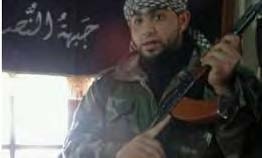
One of the amirs of the Deir ez-Zor Governorate, killed when an IED attached to his car blew up on June 27, 2013 (alhadathnews.net)
The military frameworks of the Al-Nusra Front (as well as other rebel organizations) are often named “brigades”, “battalions”, or “companies”. In practice, however, these are not established, organized military frameworks such as those one may find in a regular army. According to some reports, some of the Al-Nusra Front’s “companies” are made up of a single nationality (“Tunisian company”, “Chechen company”). In our assessment, this is both convenient and may help the organization in the long run by creating jihadist core networks that will go back to their home countries having acquired operative experience in the Syrian civil war.
“Battalions” and “companies” in the Al-Nusra Front
The Al-Nusra Front directs its military operations in Syria’s various governorates from local command rooms (also referred to as “ops rooms”), situated in rebel controlled areas. These command rooms are usually located in civilian facilities that have been converted to military needs. Some of the command rooms are shared by the Al-Nusra Front and the Free Syrian Army. For instance, a television crew for Hezbollah’s Al-Manar channel visited the Al-Nusra Front’s destroyed communications center after Al-Qusayr was seized. The crew reported that the communications center had a 6-meter (or 20 foot) deep tunnel where they found documents labeled “Al-Nusra Front Communications Center in Al-Qusayr”. It was also reported that a wide selection of telecommunications equipment used by the Free Syrian Army was found there (moqawama.org, June 6, 2013).
The Al-Nusra Front has a hierarchical religious establishment that supervises the military commanders’ adherence to Islamic religious law. The Al-Nusra Front’s religious establishment is headed by a grand mufti (al-qadi al-‘aam). There are Shari’ah supervisors (al-mas’oul al-shar’i[24]) serving in Syria’s various governorates. Among other things, the Shari’ah supervisors monitor the religious conduct of the commanders and operatives, and inculcate them with the organization’s Islamic ideology.
In the so-called “liberated areas” where the Al-Nusra Front has filled the power vacuum, it has created, along with other jihadist organizations, a system of justice and law enforcement called the Shari’ah Authority” (Al-Hay’ah al-Shar’iyyah). The Shari’ah Authority operates its own police force called the Shari’ah Authority Police (Shurtat al-Hay’ah al-Shar’iyyah). In the various governorates there are also Shari’ah courts where local disputes can be resolved. The Shari’ah authority is involved in assisting local residents, such as distributing food products and running infrastructures and public authorities (see below).
The Al-Nusra Front leadership
The information we have on the Al-Nusra Front leadership is incomplete. The organization is headed by Abu Muhammad al-Julani, who carries the title of amir[25] (given to leaders of Islamic organizations). We have no knowledge of his real name. There have been various unconfirmed reports on the Syrian and Arab media about his name. It can be estimated that he is of Syrian descent, possibly from the Golan Heights (‘Julani’ means ‘from Golan’ — operatives belonging to global jihad organizations often name themselves after their places of origin).

A video posted on YouTube shows the above image while Abu Muhammad al-Julani can be heard speaking off-screen (youtube.com, April 10, 2013). There is no evidence that the person seen in the photograph is in fact Abu Muhammad al-Julani.
The study carried out by the U.K.-based Quilliam Foundation about the Al-Nusra Front states that Al-Julani was formerly one of Al-Zarqawi’s staunch supporters, who had come to Iraq following the U.S. invasion in March 2003. According to the study, the organization’s members accept Al-Julani’s leadership due to the considerable experience he gained in Iraq (it is possible that in the meantime his leadership has been somewhat compromised due to the split between the Al-Nusra Front and the Islamic State). According to the study, Al-Julani closely guards his privacy. He is surrounded by a handful of close allies, comes to meetings with his face covered, is always masked and has his voice distorted in videos, and refrains from exposing personal details about himself, both in the media and in meetings with Al-Nusra Front operatives.
Al-Julani’s worldview is based on that of Al-Qaeda, with several adjustments to the particular nature of the Syrian arena. In a video posted by the Al-Nusra Front on January 24, 2012 to announce its founding, Al-Julani said that toppling the Assad regime was only half the struggle, since the organization’s goal was to have the entire regime toppled and replaced by an Islamic state governed by Islamic religious law (Shari’ah). He argued that the rebels’ accepting Western assistance to topple the Syrian regime was a crime which Allah would not forgive (youtube.com). In another video, posted in late December 2012, Al-Julani said that the Al-Nusra Front became the main force fighting against the Syrian regime. He warned his supporters and the Syrian people about “attempts to replace the Syrian regime with a Western regime” and called on his supporters to help the local citizens.
On May 16, 2013 the U.S. State Department designated Abu Muhammad al-Julani as an international terrorist (state.gov). Explaining its decision, the State Department stated that Al-Nusra Front leader Muhammad al-Julani was appointed by Al-Qaeda in Iraq to topple the Syrian regime and enforce Islamic law. Al-Julani publicly swore allegiance to Al-Qaeda leader Al-Zawahiri. Under his leadership, the Al-Nusra Front carried out multiple suicide bombing attacks that killed innocent Syrian civilians. According to the U.S. State Department, the violent, radical, and sectarian vision of Al-Julani’s Al-Nusra Front is at odds with the aspirations of the Syrian people, who are opposed to radicalism and the ideology of terrorism.
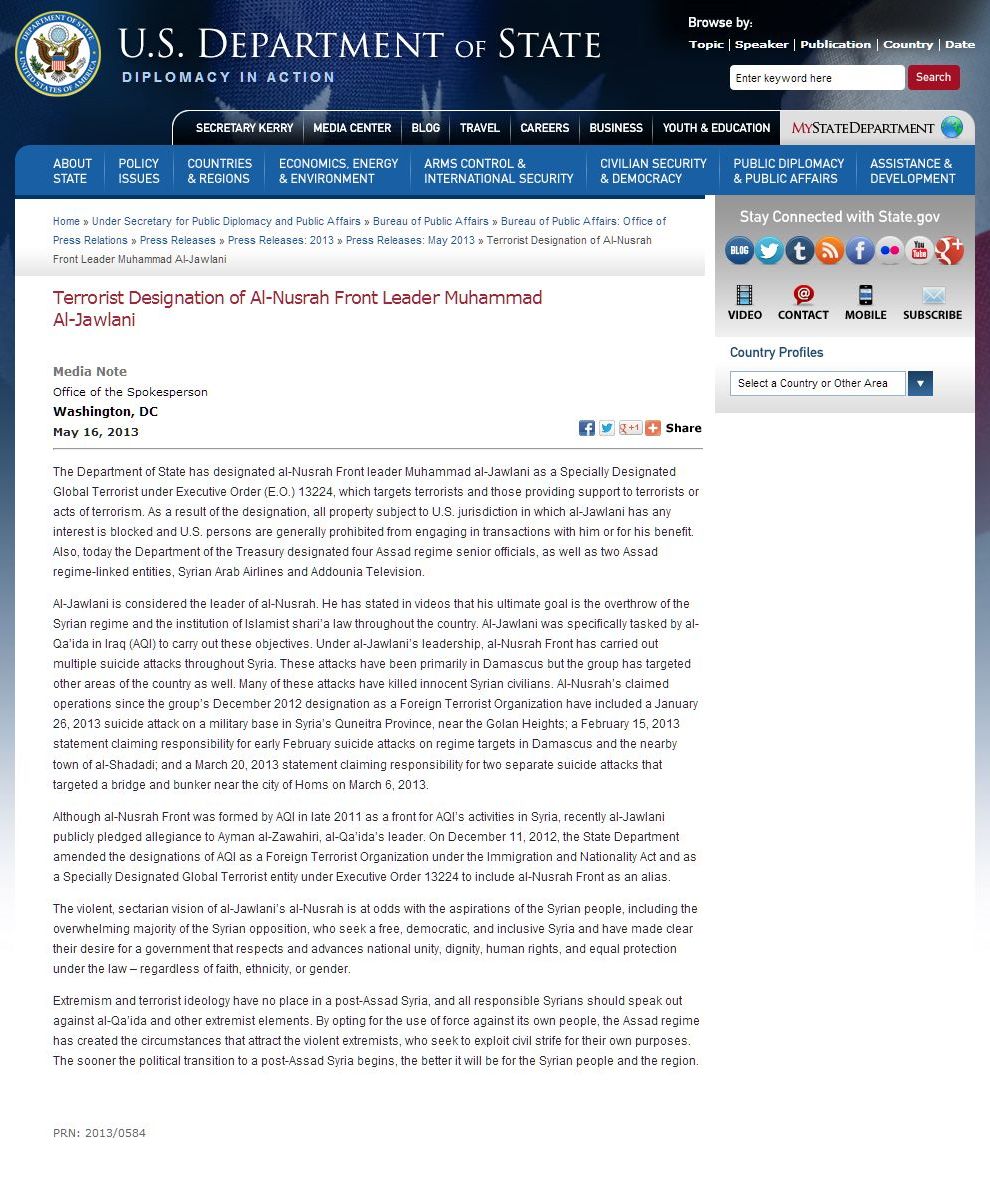
A statement released by the U.S. State Department on May 16, 2013, designating Abu Muhammad al-Julani (spelled as Muhammad Al-Jawlani) as an international terrorist. The statement did not mention his real name.
The following are details on other senior operatives in the Al-Nusra Front:
- Mustafa Abd al-Latif Salih (Abu Anas al-Sahhaba): a top military operative in the Al-Nusra Front who fought for Abu Musab al-Zarqawi in Iraq. Worked as a recruiter into the Al-Qaeda network in Syria and was responsible for transferring the operatives from Iraq to Syria. According to an Al-Jazeera report from December 13, 2012, he is a Jordanian citizen (according to other sources, he is a Palestinian from Jordan). According to that report, he was appointed as commander (amir) of the Daraa Governorate to replace Iyad al-Tubasi, who was killed in the fighting (longwarjournal.org).
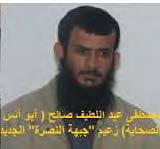
Mustafa Abd al-Latif Salih (Abu Anas al-Sahhaba) (onlinejihadexposed.com). According to another source, this is not his photograph but that of Al-Tubasi, the former commander of the Daraa Governorate.
- Maysar Ali Musa Abdallah al-Juburi: an operative who gained combat experience in Iraq while fighting against the U.S. and the allied forces. Suspected of involvement in a terrorist attack in the Ninawa Governorate in 2004. In late 2011 he relocated to Syria via Mosul, Iraq, to spread Al-Qaeda’s ideology and form a military terrorist infrastructure like that in Iraq. In mid-2012 he became the top military and ideological commander in eastern Syria, where he ran a training camp for the Al-Nusra Front (treasury.gov).
- Anas Hassan Khattab: according to the U.S. Treasury Department, Khattab was involved with the formation of the Al-Nusra Front for Al-Qaeda in Iraq. After coming to Syria he worked closely with Al-Qaeda in Iraq to obtain assistance in weapons and funding (U.S. Treasury Department website).
- Abu Hassan: one of the Al-Nusra Front’s commanders (amirs) in Idlib.
- Abu Muhammad al-Kurdi: a field commander in eastern Syria.
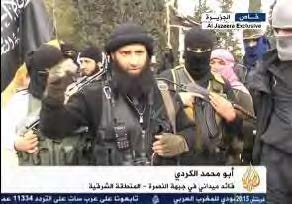
Abu Muhammad al-Kurdi, referred to on Al-Jazeera TV as an Al-Nusra Front field commander in eastern Syria (youtube.com). It is the same person who appears in the video where Abu Muhammad al-Julani’s voice can be heard.
- Abu Bakr: a top Al-Nusra Front operative in Aleppo. Formerly worked as a high school teacher.
Security and intelligence
The Al-Nusra Front maintains strict security procedures, violating which may be punishable by death. That policy draws its legitimacy from a religious doctrine, based on the principle that betraying the organization is the same as betraying Islam and the Muslims. True to its security policy, the Al-Nusra Front avoids any open discussions on issues that concern the organization, and releases no reliable reports on the organization’s structure, chain of command, and functioning (it does, however, release propaganda reports as part of the battle for hearts and minds).
Al-Nusra Front members have very compartmentalized access to information on its structure, leadership, and methods of operation. The Al-Nusra Front’s organizational culture rests on the idea that every individual must attend to their own responsibilities and protect the organization by maintaining secrecy. Most Al-Nusra Front operatives use codenames and many have more than one (fighters with operative experience are offered to choose a new codename so as not to expose information about their past).
The Al-Nusra Front runs an intelligence network for operative needs in areas where it fights against the Syrian regime. A video released by the Al-Nusra Front about a suicide car bombing at a Syrian army camp in Al-Qusayr (January 23, 2013) shows that the organization uses Google Earth photographs for its military operations.
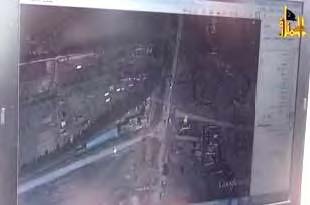
A laptop computer with a Google Earth view of the route to the destination (in this case, the Syrian army camp near Al-Qusayr where a truck laden with explosives blew up)
Fundraising
Overview
Early on, the Al-Nusra Front relied on financial assistance from Al-Qaeda in Iraq, from which it branched out. In Abu Muhammad al-Julani’s oath of allegiance to Al-Qaeda leader Al-Zawahiri, which marked the beginning of the Al-Nusra Front’s split from the original Iraqi organization, he thanked Abu Bakr al-Baghdadi, the leader of Al-Qaeda’s branch in Iraq, for “giving us some of the funds of the [Islamic] State [of Iraq] despite the difficult situation it was in.”
Following the split between the two branches, the Al-Nusra Front started to establish its own apparatus for fundraising and purchasing weapons and equipment. It is likely that those efforts were coordinated with the leadership of Al-Qaeda, headed by Al-Zawahiri. Our impression is that, in the course of its existence, the organization has been able to establish its own support network, which, in our assessment, relies on Salafist-jihadi charitable societies, Salafist clerics, and wealthy Al-Qaeda supporters in Kuwait, Qatar, Saudi Arabia, and possibly Egypt.[26] However, we believe that the organizations and individuals sponsoring the Al-Nusra Front prefer not to mention that explicitly to avoid becoming identified with Al-Qaeda and being exposed to pressure from local authorities. In some cases it was said that funds and weapons were being collected for “jihad warriors” in Syria, without any further details. It is our assessment that in other cases the donors and supporters attempt to create the false impression of helping other rebel groups (such as the Free Syrian Army and Islamist groups that are not affiliated with Al-Qaeda).
The Al-Nusra Front also receives donations from sympathetic Syrians (who live in Syria and elsewhere). The organization also exploits natural resources in the areas it controls (particularly oil and gas fields) and promotes “business initiatives” in those areas for financial gain. The money thus earned is used to fund assistance to Syrian residents, pay operatives’ salaries, and purchase weapons (see below).
Fundraising in Saudi Arabia and Kuwait
The following Salafist figures in Saudi Arabia and Kuwait are some of those involved in raising funds for the so-called “jihad warriors” in Syria:
- Dr. Muhammad al-Arifi, a Saudi sheikh
- Shafi al-Ajmi, a Kuwaiti sheikh
- Dr. Waleed al-Tabtabaie, a former Kuwaiti MP
- Abd al-Rahman al-Naimi, a Qatari businessman
- Ali al-Suwaidi, director of a Qatari charitable society
Sheikh Muhammad al-Arifi
Dr. Muhammad al-Arifi is a Saudi sheikh affiliated with radical Salafism. According to Al-Arifi, since the beginning of the uprising in Syria numerous Islamic conferences have convened to raise funds “for the fighters in Syria”. The largest conference convened in Egypt on June 12, 2013. It was attended by Muslim clerics from various schools of thought and potential donors who donated to the “jihad warriors” in Syria (youtube.com).
It may be assumed that a considerable proportion of the donations collected by those Islamic conferences is sent to rebel groups affiliated with the Free Syrian Army and the Muslim Brotherhood,[27] or to other Islamic groups that are not necessarily affiliated with Al-Qaeda. However, the term “jihad warriors” could also refer to operatives belonging to Salafist-jihadi organizations, including the Al-Nusra Front, who may find themselves on the receiving end of donations and weapons.
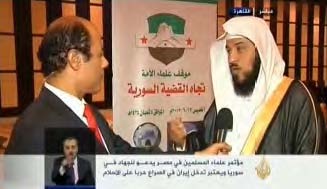
Al-Jazeera’s coverage of the Islamic conference in Egypt: an interview with Saudi Sheikh Dr. Muhammad al-Arifi, affiliated with the radical Salafi school of thought, who has often called for jihad against the Syrian regime. At one point he expressed his support for Al-Qaeda, for which he apologized later, apparently due to concerns about the Saudi authorities.
Sheikh Shafi al-Ajmi
Another individual involved in raising funds for Islamic organizations, including those of Salafist-jihadi character, is Shafi al-Ajmi, a radical Salafist sheikh from Kuwait. In the first half of 2013 a campaign took place in Kuwait to enlist “jihad warriors”. It was called “Journey to Train 12,000 Jihad Warriors for the Fighting in Syria”. The campaign participants included Sheikh Shafi al-Ajmi and other Muslim clerics from various schools of thought, some of them affiliated with the Muslim Brotherhood. Once again, the term “jihad warriors” may be a veiled reference to the Al-Nusra Front, even though Sheikh Shafi al-Ajmi does not explicitly admit it.
A video posted on YouTube in June 2013 featured Sheikh Shafi al-Ajmi, who called on viewers to donate funds that would be used to purchase arms and ammunition for the fighters in Syria (without clearly mentioning the organization to which those fighters belonged). In our assessment, his appearance was part of the campaign to train 12,000 jihad warriors. The following are the main points he brought up:
- “We are planning to purchase missiles, [including] anti-aircraft missiles, explosive charges, and RPG [launchers]. We are already purchasing [these weapons] and will continue to do so. Any country that tries to stop us is a conspirator and a traitor that will meet the same fate as the Syrian regime”.
- “The assistance that the fighters in Syria require first of all is heat-seeking missiles and [other] guided missiles, which cost $8,000 [each]. In addition they need fragmentation charges that cost $1,000 [each] and RPG rockets that cost $800 [each]. They also need 23-mm anti-aircraft machineguns.” The sheikh stressed, “We are collecting the money to purchase these weapons.”
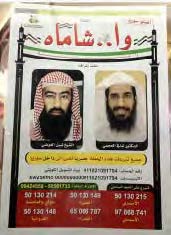
Sheikh Shafi al-Ajmi and Sheikh Nabil al-Awadi (who is affiliated with the Muslim Brotherhood) raise funds for the fighters in Syria while mentioning account numbers and contact phones
Sheikh Shafi al-Ajmi did not mention the identity of the “jihad warriors” for whom the weapons were being purchased, and neither did he state the final destination of the donations. However, he is a Salafist, the terminology he uses is Salafist-jihadi, and he is clearly sympathetic with the jihadists fighting in Syria. It can be assumed, therefore, that at least some of the missiles, explosive charges, RPG launchers, and anti-aircraft machineguns discussed by the sheikh in his speech are destined, at least in part, for Salafist-jihadi groups, including the Al-Nusra Front.
Dr. Waleed al-Tabtabaie
Another individual involved in raising funds, purchasing weapons, and transferring them to Syria is Dr. Waleed al-Tabtabaie, a former Kuwaiti MP from the Salafi school of thought. On December 31, 2008 he took part in a rally of sympathy with Gaza, held in Kuwait under the auspices of the Salafi movement. In a speech delivered at the rally he praised jihad warrior (mujahed) Isma’il Haniyah and held up his shoe in defiance of Mahmoud Abbas, chairman of the Palestinian Authority. He took part in the Mavi Marmara flotilla in May 2010 and, according to the Kuwaiti newspaper Al-Ra’i, wrote a will before boarding the vessel (as was done by Turkish radical Islamic operatives who took part in the fighting against the IDF).
Dr. Waleed al-Tabtabaie took part in the campaign to train 12,000 jihad warriors in Syria. He also illegally crossed into Syrian territory and gave an interview to Al-Jazeera from Aleppo (June 21, 2013). In the interview he said, “Today 3,000 warriors have completed their preparations for the fighting [in Syria]. One thousand [of them] will be stationed in Aleppo, tomorrow a thousand more will be stationed in Idlib, and later another thousand [will be stationed] in northern Hama. This is the first part of the campaign to train 12,000 fighters in Syria” (youtube.com). He refrained from mentioning the names of the organizations which the jihad warriors would join or the destination of the money raised in the campaign; however, he was filmed on the backdrop of the flag of Liwa al-Tawhid, an Islamic military framework that has operative cooperation with Al-Nusra Front.
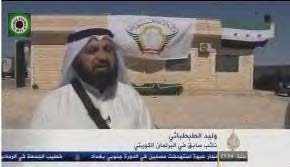
Waleed al-Tabtabaie, a former Kuwaiti MP from the Salafi school of thought, in an interview to Al-Jazeera from Aleppo (June 21, 2013, youtube.com). Clearly visible behind the sheikh is the flag of Liwa al-Tawhid, an Islamic organization that has operative cooperation with the Al-Nusra Front.
According to an article published in the French newspaper Le Figaro on July 24, 2013, which cites, among other things, a Syrian opposition source, Dr. Waleed al-Tabtabaie is the head of the Kuwaiti Committee for Supporting the Mujahedeen. The article states that couriers from Kuwait, Qatar, and Saudi Arabia deliver funds to radical rebel groups via Turkey, Jordan, or Lebanon.
Abd al-Rahman al-Naimi
According to an article published in Le Figaro on July 24, 2013, messengers working for the Qatari sheikhs Abd al-Rahman Naimi and Ali al-Suwaidi transfer funds to jihad fighters in Syria. Hezbollah’s Al-Ahd website said that Abd al-Rahman al-Naimi is a Qatari businessman affiliated with the Salafi school of thought who is close to Waleed al-Tabtabaie. Both are closely involved with Kuwaiti Sheikh Shafi al-Ajmi, mentioned above. According to Al-Ahd, Shafi al-Ajmi dispatches armed operatives to Syria using funds raised by Al-Tabtabaie and Al-Naimi. Both run Wasal, a TV station of Salafist-jihadi character that broadcasts from Saudi Arabia (Al-Ahd website citing the Al-Ahd newspaper, June 12, 2012).
Ali al-Suwaidi
Ali al-Suwaidi is the director of a Qatari charitable society called Mu’assasat ‘Eid bin Muhammad Aal Thani al-Khayriyya (the Eid bin Muhammad Aal Thani Charitable Society). The society conducts a variety of humanitarian activities in Syria and elsewhere. Among other things, the society is involved in establishing and running eight field infirmaries in Syria, as well as providing food and shelter to refugees (alwatan.com). According to the Shia Rights Watch, it is an organization that spreads the Salafi school of thought in Syria and fans hatred against the Shi’ites (ar.wikipedia).
Acquiring weapons and smuggling them into Syria
It is our assessment that the Al-Nusra Front relies on several sources for the acquisition of weapons:
- Designated Al-Nusra Front networks: these networks are operated by Salafist-jihadi figures and organizations from across the Arab world, which purchase weapons for the Al-Nusra Front and other organizations of Salafistjihadi character. The weapons are smuggled into Syria through Iraq, Jordan, Turkey, and Lebanon, whose borders with Syria are almost completely wide open. In other instances the necessary equipment is sent along with jihadi operatives from the Arab/Muslim world who volunteer to join the Al-Nusra Front and come to Syria.
- Acquisition networks working for the rebel groups: Saudi Arabia and Persian Gulf states, as well as Western countries, have set up arms smuggling operations for the Free Syrian Army and rebel groups that cooperate with it. It is our assessment that some of the weapons intended for the rebels eventually find their way into the hands of jihadist rebel groups, including the Al-Nusra Front, even when they are not the intended recipients. It is very difficult to make sure that the acquired weapons actually reach their original destination, being a fundamental reason why the U.S. and European countries were hesitant about scaling up the assistance provided to the rebels[28] and arming them with high-quality weapons.
- Seizing weapons of the Syrian Army: a top Al-Nusra Front operative in the Aleppo region said that the organization has no shortage of weapons, because a raid on a Syrian regime base gave it more weapons than it could have obtained from other countries (world.time.com). In another instance, Syrian rebels were bragging about their success in taking over a stockpile of the Syrian regime’s weapons to the north of Damascus, in an assault led by the Al-Nusra Front. The rebels presented a Konkurs anti-tank missile that fell into their hands (Al-Jazeera report on YouTube, August 4, 2013).
Weapons seized by the Al-Nusra Front
The following are stills from a video showing Al-Nusra Front operatives taking over Kobra anti-aircraft missiles and Konkurs anti-tank missiles at a Syrian army road block in Al-Shadi, in the environs of Aleppo (youtube.com, February 14, 2013).
Purchasing weapons in Syria: the Al-Nusra Front and other rebel organizations purchase weapons from private traders, sometimes in shops situated in rebel-controlled territory. An Al-Jazeera reporter in Aleppo described weapons shops found in rebel-controlled areas. The story included an interview with the owner of a weapons shop in one of Aleppo’s neighborhoods, who goes by the name of Abu Adi. According to the shop owner, he “provides a service to the revolutionaries and the jihad warriors” and sells them weapons from the Shabiha (the Syrian regime’s armed militia) and the Syrian army (see details on aljazeera.net, July 23, 2013).
[*] Read the other sections here:
![]()
Notes:
[20] Unlike the Al-Nusra Front, some Islamic organizations do not intend to establish a radical Islamic Caliphate in Greater Syria and turn it into a center of regional and global jihad. Those Islamic organizations have no ideological, operative, and personal connections such as those that tie the Al-Nusra Front to Al-Qaeda and global jihad.
[21] We believe these numbers to be slightly exaggerated. However, in the time that has passed since the report was released, the number of Al-Nusra Front operatives has grown and the areas of their military deployment and operations have changed.
[22] The article is titled “The Islamic State of Iraq and ash-Sham Expands Into Rural Northern Syria”.
[23] The amir that heads the Al-Nusra Front is also referred to as the “general supervisor” (al-mas’oul al-‘aam).
[24] The Shari’ah supervisor is sometimes referred to as “Shari’ah officer” (al-dabet al-shar’i).
[25] Abu Muhammad al-Julani is also referred to as al-mas’oul (the person in charge), al-mas’oul al-‘aam (the chief person in charge), and al-sheikh al-fateh (the conquering sheikh).
[26] According to Syria’s Information Minister Omran al-Zoabi, the Al-Nusra Front obtains weapons from the Qatari official establishment, as well as from sources inside Syria and along the Syrian-Turkish border. Most fighters in Syria, he said, are funded by Saudi Arabia and Qatar (aljarida.com). The Lebanese newspaper As-Safir reported on May 31, 2013 that the Al-Nusra Front receives financial assistance from Saudi Arabia and wealthy individuals in the Persian Gulf. According to Reuters, U.S. and European officials believe that the Al-Nusra Front is funded by wealthy families from Saudi Arabia and Qatar (Reuters, June 22, 2013). In an article from July 24, 2013, Le Figaro said that funds are sent from Qatar by the couriers of the sheikhs Abd al-Rahman Na’imi and Ali Suwaidi (see below) without the formal involvement of the Qatari administration.
[27] On July 6, 2013 the Muslim Brotherhood Shura Council posted a statement on its official Facebook page expressing its appreciation to the scholars of the Islamic nation for coming to the aid of the Syrian revolution at their Cairo conference. The council says that the Free Syrian Army and “revolutionary popular elements” should be provided with money, high-quality weapons, know-how, and other assistance. The council asserts that the Muslim Brotherhood will continue adhering to moderate Islam. However, the announcement does not state that no weapons should be supplied to the Al-Nusra Front and Salafist-jihadi elements.
[28] One example of the uncertainty that surrounds the final destination of operatives and weapons sent to Syria can be found in an article by Saleh Abu Tawila in Al-Arab al-Youm, July 14, 2013. According to the article, there are smuggling networks in Jordan that send to Syria operatives who seek to join the Al-Nusra Front or the Free Syrian Army. Those networks smuggled some 50 operatives from the city of Maan, southern Jordan. They work with similar networks in Amman, Mafraq, and Daraa to ensure the safety of the operatives, provide them with the necessary equipment, and send them to various fronts in Syria.



 RSS
RSS

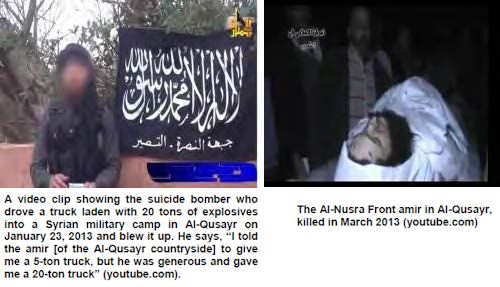
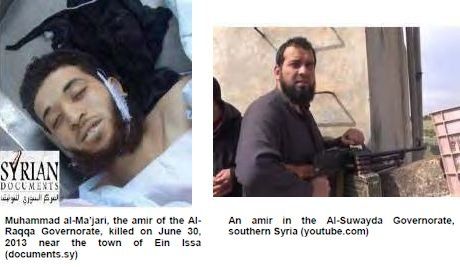
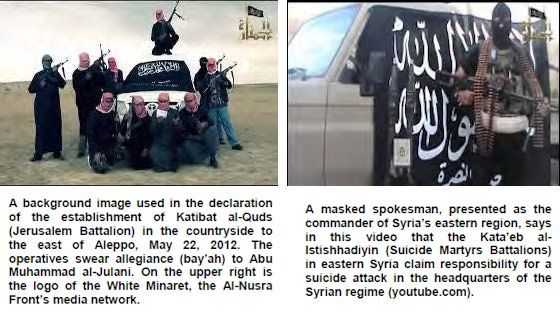
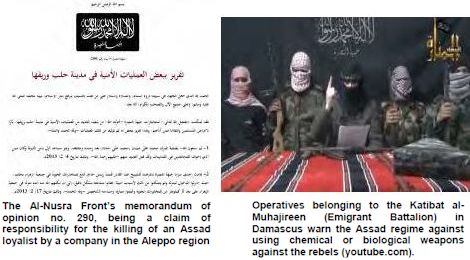

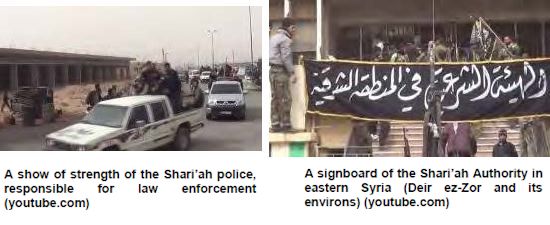
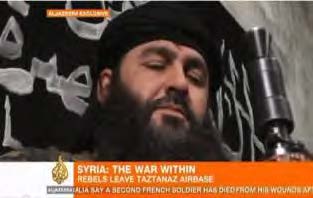
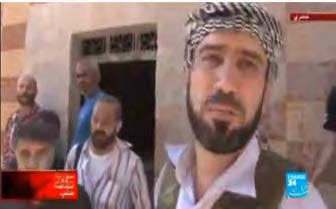
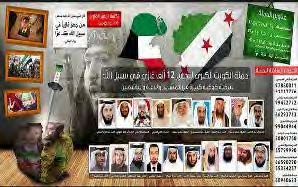
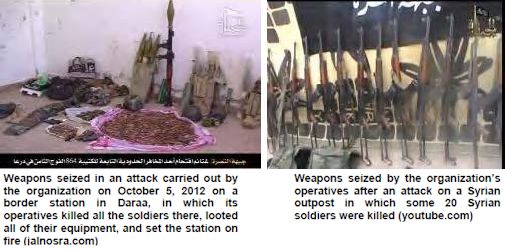


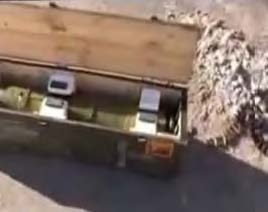
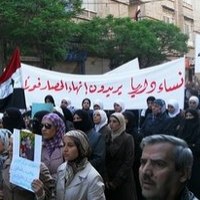
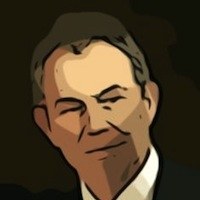


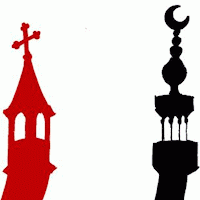




Latest Comments
... [Trackback] [...] Read More: crethiplethi.com/contact-form/trackback/ [...]...
Hello Mike, Thank you for your positive feedback to the article. I felt there wasn’t too much critical analysis of ...
Thanks for this considered and well constructed article. A follow up article on the manner in which the editorial contro...
THE CLUELESSNESS OF CLAIMING THAT OBAMA'S MIDDLE EAST POLICIES WERE A FAILURE CANNOT BE FURTHER FROM THE TRUTH, WHAT THE...
As long as Obama is the president of the usa do not trust the us government......